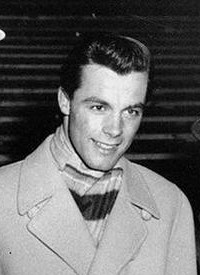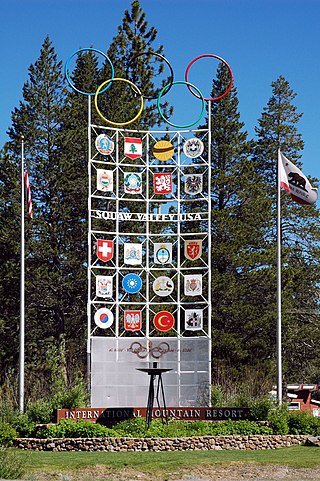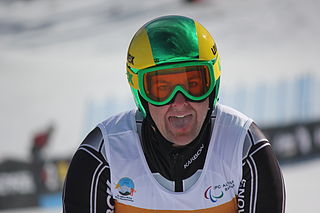
Slalom is an alpine skiing and alpine snowboarding discipline, involving skiing between poles or gates. These are spaced more closely than those in giant slalom, super giant slalom and downhill, necessitating quicker and shorter turns. Internationally, the sport is contested at the FIS Alpine World Ski Championships, and at the Olympic Winter Games.

Skiing is the use of skis to glide on snow for basic transport, a recreational activity, or a competitive winter sport. Many types of competitive skiing events are recognized by the International Olympic Committee (IOC), and the International Ski and Snowboard Federation (FIS).

Snowboarding is a recreational and competitive activity that involves descending a snow-covered surface while standing on a snowboard that is almost always attached to a rider's feet. It features in the Winter Olympic Games and Winter Paralympic Games.

Alpine skiing, or downhill skiing, is the pastime of sliding down snow-covered slopes on skis with fixed-heel bindings, unlike other types of skiing, which use skis with free-heel bindings. Whether for recreation or for sport, it is typically practiced at ski resorts, which provide such services as ski lifts, artificial snow making, snow grooming, restaurants, and ski patrol.

The 1984 Winter Olympics, officially known as the XIV Olympic Winter Games and commonly known as Sarajevo '84, were a winter multi-sport event held between 8 and 19 February 1984 in Sarajevo, Yugoslavia. It was the first Winter Olympic Games held in a Slavic language-speaking country, as well as the only Winter Olympics held in a communist country before the 2022 Winter Olympics in Beijing, China. It was the second consecutive Olympic Games held in a communist country, after the 1980 Summer Olympics in Moscow, Russian SFSR, Soviet Union.

Anton Engelbert "Toni" Sailer was an Austrian alpine ski racer, considered among the best in the sport. At age 20, he won all three gold medals in alpine skiing at the 1956 Winter Olympics. He nearly duplicated the feat at the 1958 World Championships with two golds and a silver. He also won world titles both years in the combined, then a "paper" race, but awarded with medals by the International Ski Federation (FIS).

Garmisch-Partenkirchen is an Alpine ski town in Bavaria, southern Germany. It is the seat of government of the district of Garmisch-Partenkirchen, in the Oberbayern region, which borders Austria. Nearby is Germany's highest mountain, Zugspitze, at 2,962 metres (9,718 ft) above sea level.

Hermann Maier is an Austrian former World Cup champion alpine ski racer and Olympic gold medalist. Nicknamed the "Herminator", Maier ranks among the greatest alpine ski racers in history, with four overall World Cup titles, two Olympic gold medals, and three World Championship titles. His 54 World Cup race victories – 24 super-G, 15 downhills, 14 giant slaloms, and 1 combined – rank third on the men's all-time list behind Ingemar Stenmark's 86 victories and Marcel Hirscher's 67 victories. Until 2023 he held the record for the most points in one season by a male alpine skier, with 2000 points from the 2000 season. From 2000–2013 he also held the title of most points in one season by any alpine skier, until Tina Maze scored 2414 points in the 2013 season.

Skis Rossignol S.A., or simply Rossignol, is a French manufacturer of alpine, snowboard, and Nordic equipment, as well as related outerwear and accessories, located in Isère, France. Rossignol was one of the first companies to produce plastic skis. The company also owns the brands Dynastar and LOOK. In 2005, Rossignol was bought by boardsport equipment manufacturer Quiksilver for $560 million. In 2008, Quiksilver made a deal to sell Rossignol for $147 million to a former chief executive, Bruno Cercley.

Olympic Valley is an unincorporated community located in Placer County, California northwest of Tahoe City along California State Highway 89 on the banks of the Truckee River near Lake Tahoe. It is home to Palisades Tahoe, the site of the 1960 Winter Olympics. Olympic Valley is the smallest resort area to host the Olympic Winter Games.

Australia sent a delegation to compete at the 1952 Winter Olympics from 14 to 25 February 1952 in Oslo, Norway. This was the nation's second appearance at the Winter Olympic Games with their first being in 1936.

The U.S. Ski Team, operating under the auspices of U.S. Ski & Snowboard, develops and supports men's and women's athletes in the sports of alpine skiing, freestyle skiing, cross-country, ski jumping, and Nordic combined. Since 1974 the team and association have been headquartered in Park City, Utah.
The 9th World Cup season began in December 1974 in France and concluded in March 1975 in Italy. Gustav Thöni of Italy would regain the overall title, his fourth overall title in five seasons. Annemarie Moser-Pröll of Austria won the women's overall title, her fifth consecutive.

Paralympic alpine skiing is an adaptation of alpine skiing for athletes with a disability. The sport evolved from the efforts of disabled veterans in Germany and Austria during and after the Second World War. The sport is governed by the International Paralympic Committee Sports Committee. The primary equipment used includes outrigger skis, sit-skis, and mono-skis. Para-alpine skiing disciplines include the downhill, super-G, giant slalom, slalom, super combined, and snowboard.
Michael von Grünigen is a Swiss former alpine skier. He is considered to be the most successful Giant slalom skier of his era: In 1996, 1997, 1999 and 2003, he won the World Cup in Giant slalom. In 1997 and 2001, he was World Champion in giant slalom. He took a total of 23 World Cup wins during his career. Having originally announced his retirement at the 2002 Winter Olympics in Salt Lake City, after failing to medal at the Games he elected to delay his retirement for a year, ending his competitive career in 2003.

Australia sent a delegation to compete at the 1988 Winter Paralympics in Innsbruck, Austria, which was held between 17–24 January 1988. This marked the nation's fourth appearance at the Winter Paralympics. The delegation sent a group of five alpine skiers as they wouldn't get a medal in these games.
Para-alpine skiing classification is the classification system for para-alpine skiing designed to ensure fair competition between alpine skiers with different types of disabilities. The classifications are grouped into three general disability types: standing, blind and sitting. Classification governance is handled by International Paralympic Committee Alpine Skiing. Prior to that, several sport governing bodies dealt with classification including the International Sports Organization for the Disabled (ISOD), International Stoke Mandeville Games Federation (ISMWSF), International Blind Sports Federation (IBSA) and Cerebral Palsy International Sports and Recreation Association (CP-ISRA). Some classification systems are governed by bodies other than International Paralympic Committee Alpine Skiing, such as the Special Olympics. The sport is open to all competitors with a visual or physical disability. It is not open to people with intellectual disabilities.

Para-Nordic skiing classification is the classification system for para-Nordic skiing which includes the biathlon and cross-country events. The classifications for Para-Nordic skiing mirrors the classifications for Para-Alpine skiing with some exceptions. A functional mobility and medical classification is in use, with skiers being divided into three groups: standing skiers, sit skiers and visually impaired skiers. International classification is governed by International Paralympic Committee, Nordic Skiing (IPC-NS). Other classification is handled by national bodies. Before the IPC-NS took over classification, a number of organizations handled classification based on the type of disability.

LW1 is a para-alpine standing skiing classification for people with severe lower extreme disabilities in both extremities. It includes both skiers with amputations and cerebral palsy. International classification is done through IPC Alpine Skiing, and national classification through local national sport federations. LW1 classified skiers use outriggers, and two skis or one ski with a prosthesis. Other equipment is used during training such as ski-tips, ski-bras, and short skis.
Armenia sent competitors to the 2018 Winter Paralympics in Pyeongchang, South Korea. The country sent one para-alpine skier, Sasun Hakobyan. He qualified for the Winter Games in November 2017, and was named to the team before any of the country's Olympic people.














